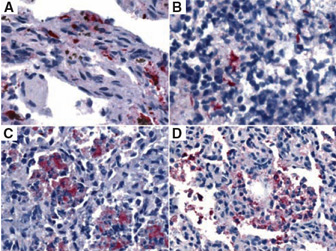A variant of the deadly Ebola virus has turned up in pigs in the Philippines, report researchers writing in the journal Science.
Roger W. Barrette and colleagues documented Reston ebolavirus (“REBOV”), a virus previously known to infect monkeys and humans, among domestic pigs “experiencing unusually severe outbreaks of porcine reproductive and respiratory disease” in the Philippines.
The authors warn that while there are no signs the virus spread between pigs and farm workers, the emergence of Reston ebolavirus in the human food chain “is of concern.” They authors suggest that “it is hypothetically possible that the virus could mutate in pigs and become more dangerous for humans.”
 Lymph node capsule stained for EBOV antigens. (B) Lymph node tissue stained for EBOV antigens. (C) Lung tissue stained for EBOV antigens. (D) Lung tissue stained for PRRSV antigens. Photograph courtesy of Science. |
REBOV virus was first identified in 1989 in the United States from a shipment of cynomolgus monkeys (Macaca fascicularis) from the Philippines. Outbreaks of disease, which manifested as a high contagious hemorrhagic fever, occurred in the United States in 1990 and 1996 and in Italy in 1992. The outbreaks were traced back to a facility in the Philippines.
Roger W. Barrette et al. Discovery of Swine as a Host for the Reston ebolavirus. SCIENCE VOL 325 10 JULY 2009














